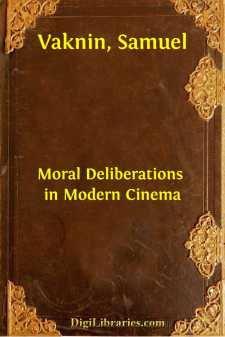Categories
- Antiques & Collectibles 13
- Architecture 36
- Art 48
- Bibles 22
- Biography & Autobiography 813
- Body, Mind & Spirit 142
- Business & Economics 28
- Children's Books 15
- Children's Fiction 12
- Computers 4
- Cooking 94
- Crafts & Hobbies 4
- Drama 346
- Education 46
- Family & Relationships 57
- Fiction 11828
- Games 19
- Gardening 17
- Health & Fitness 34
- History 1377
- House & Home 1
- Humor 147
- Juvenile Fiction 1873
- Juvenile Nonfiction 202
- Language Arts & Disciplines 88
- Law 16
- Literary Collections 686
- Literary Criticism 179
- Mathematics 13
- Medical 41
- Music 40
- Nature 179
- Non-Classifiable 1768
- Performing Arts 7
- Periodicals 1453
- Philosophy 64
- Photography 2
- Poetry 896
- Political Science 203
- Psychology 42
- Reference 154
- Religion 513
- Science 126
- Self-Help 84
- Social Science 81
- Sports & Recreation 34
- Study Aids 3
- Technology & Engineering 59
- Transportation 23
- Travel 463
- True Crime 29
Moral Deliberations in Modern Cinema
by: Samuel Vaknin
Description:
Excerpt
"The Talented Mr. Ripley" is an Hitchcockian and blood-curdling study of the psychopath and his victims. At the centre of this masterpiece, set in the exquisitely decadent scapes of Italy, is a titanic encounter between Ripley, the aforementioned psychopath protagonist and young Greenleaf, a consummate narcissist.
Ripley is a cartoonishly poor young adult whose overriding desire is to belong to a higher - or at least, richer - social class. While he waits upon the subjects of his not so hidden desires, he receives an offer he cannot refuse: to travel to Italy to retrieve the spoiled and hedonistic son of a shipbuilding magnate, Greenleaf Senior. He embarks upon a study of Junior's biography, personality, likes and hobbies. In a chillingly detailed process, he actually assumes Greenleaf's identity. Disembarking from a luxurious Cunard liner in his destination, Italy, he "confesses" to a gullible textile-heiress that he is the young Greenleaf, travelling incognito.
Thus, we are subtly introduced to the two over-riding themes of the antisocial personality disorder (still labelled by many professional authorities "psychopathy" and "sociopathy"): an overwhelming dysphoria and an even more overweening drive to assuage this angst by belonging. The psychopath is an unhappy person. He is besieged by recurrent depression bouts, hypochondria and an overpowering sense of alienation and drift. He is bored with his own life and is permeated by a seething and explosive envy of the lucky, the mighty, the clever, the have it alls, the know it alls, the handsome, the happy - in short: his opposites. He feels discriminated against and dealt a poor hand in the great poker game called life. He is driven obsessively to right these perceived wrongs and feels entirely justified in adopting whatever means he deems necessary in pursuing this goal.
Ripley's reality test is maintained throughout the film. In other words - while he gradually merges with the object of his admiring emulation, the young Greenleaf - Ripley can always tell the difference. After he kills Greenleaf in self-defense, he assumes his name, wears his clothes, cashes his checks and makes phone calls from his rooms. But he also murders - or tries to murder - those who suspect the truth. These acts of lethal self-preservation prove conclusively that he knows who he is and that he fully realizes that his acts are parlously illegal.
Young Greenleaf is young, captivatingly energetic, infinitely charming, breathtakingly handsome and deceivingly emotional. He lacks real talents - he know how to play only six jazz tunes, can't make up his musical mind between his faithful sax and a newly alluring drum kit and, an aspiring writer, can't even spell. These shortcomings and discrepancies are tucked under a glittering facade of non-chalance, refreshing spontaneity, an experimental spirit, unrepressed sexuality and unrestrained adventurism. But Greenleaf Jr. is a garden variety narcissist. He cheats on his lovely and loving girlfriend, Marge. He refuses to lend money - of which he seems to have an unlimited supply, courtesy his ever more disenchanted father - to a girl he impregnated. She commits suicide and he blames the primitiveness of the emergency services, sulks and kicks his precious record player. In the midst of this infantile temper tantrum the rudiments of a conscience are visible....



